If there’s one word that can describe field spaniels, then it’s none other than the all-rounder. Whether water or land, you’d find this dog full of energy, agility, and endurance in the work field.
However, when at home, this dog will turn into the most people-pleasing pet you’ve ever seen.
Its docile nature makes it the best companion for people of all ages, including young and adults. At the same time, its super charming and playful personality will be enough to fill every moment of your life with bliss.
Don’t worry, despite having an enchanting nature, with a high urge to delight people, this dog is mostly grumpy and aloof towards strangers. And when it comes to the security and well-being of its family members, this dog won’t be shy or scared of even sacrificing his own life.
This high-energy dog breed features the strength of hard-working canines, which means no dog sports will be too much for them. Sadly, despite these amazing qualities, field spaniel is considered a rare breed and not so popular among dog owners.
However, if you are thinking about adopting an unusual-looking dog to amaze all the passersby and neighbors, you should look no further. To educate you more about this spaniel dog breed, we’ve penned down all the essential aspects of it, in detail, below.
Keep reading as who knows, this dark, elongated, astounding dog could be the next addition to your pet family.
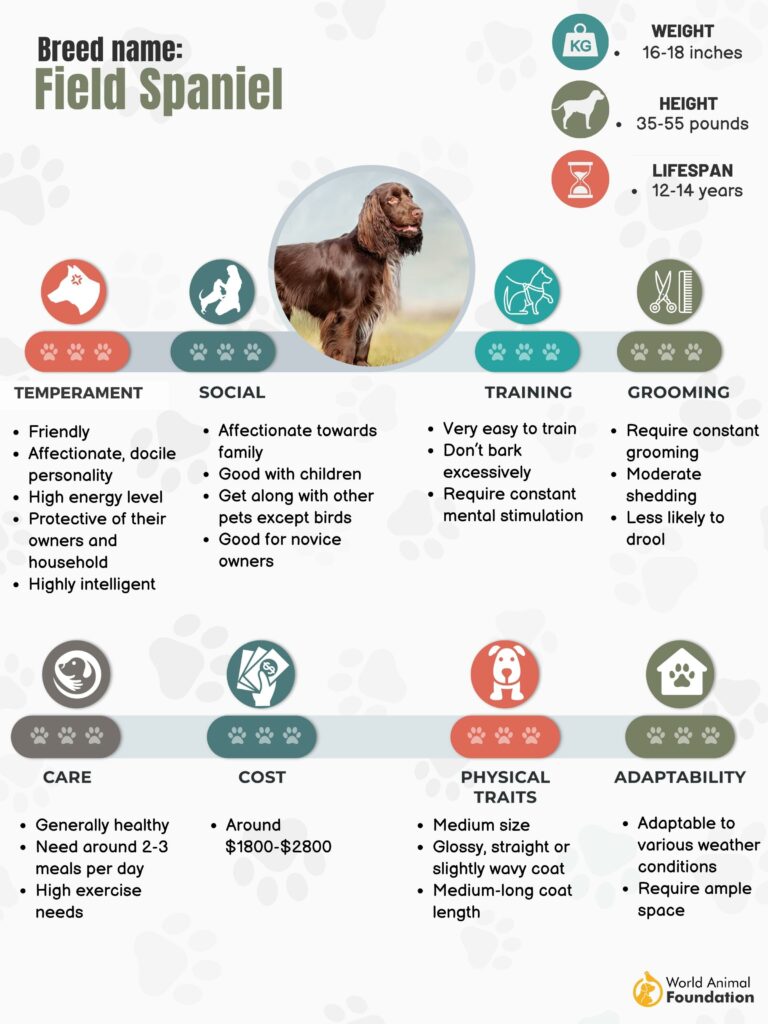
About the Breed
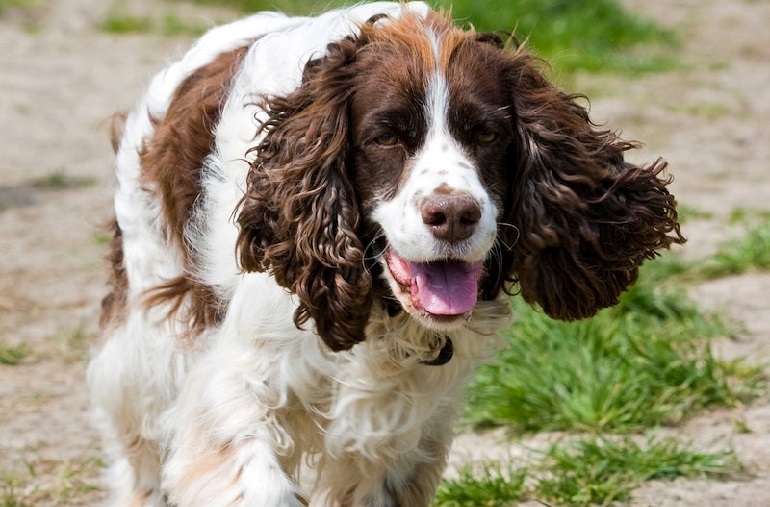
Although field spaniels were originally bred as all-black show ring dogs, the area in which these dogs shine today is their adaptability to family life. Especially if you have an extended family who loves sports and adventure, this dog is the perfect pet for you.
Being sensitive and pliant, these friendly dogs can understand your will & desires and act accordingly. Even the US breed standard refers to this dog breed as an unusually docile breed. Still, these sporting dogs remain unbeatable and highly vigorous in working fields or sports grounds.
These dogs resemble other spaniels of the family, including English springer spaniels, cocker spaniels, and Sussex spaniels.
Since they feature a short stature and dark coat, they can hide and run easily across the heavy bushes, by maintaining a dense cover. Their coat colors camouflage them amazingly, so the game won’t notice them scooting closer.
Due to this very trait, this dog is highly appreciated by hunters, all around the world. And since these field spaniels are intelligent, they are super easy to train.
Just indulge them in agility, obedience, hunting, and trekking training from an early age, and you’ll end up with a super competitive dog, making the best candidate for human companionship.
Remember that these active dogs come with high exercise needs, so if you won’t give them sufficient playtime, they might show destructive behaviors. Due to the same reasons, they are not well adapted to apartment life, regardless of how much field spaniel loves to stay around people.
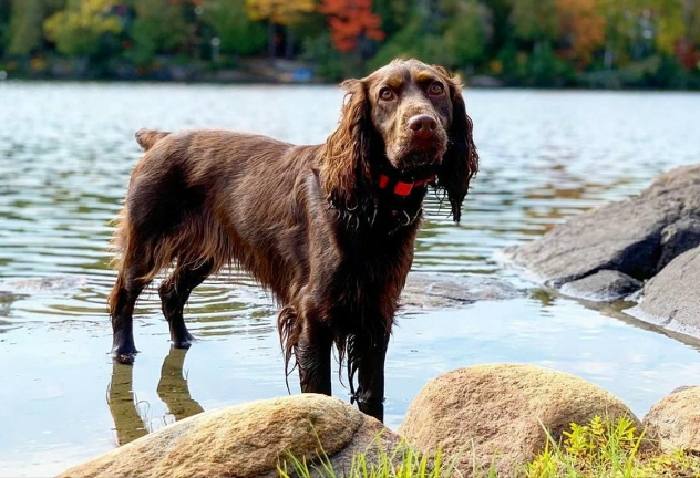
However, if you live in a house with a medium-sized, fenced yard, it would be sufficient for a field spaniel to vent his energy out. Speaking of their interactions with family members, field spaniels can be trusted with children and other dogs.
Still, you should supervise everything when a field spaniel puppy is playing with your toddler since the little, fragile pup might get hurt during the rough play. The good thing here is that, unlike other breeds, this one doesn’t do any harm to your kids, even after getting hit by them.
Having an extremely devoted nature, they’d prefer to walk away from the kid than barking or nibble at him. And yes, they also use their minds to choose their favorite human and sort out their enemies.
Due to their super cautious nature, they make good watchdogs. However, since they are not that fighter-sort-of-dogs, you should not expect them to serve you well as guard dogs.
History of the Field Spaniel
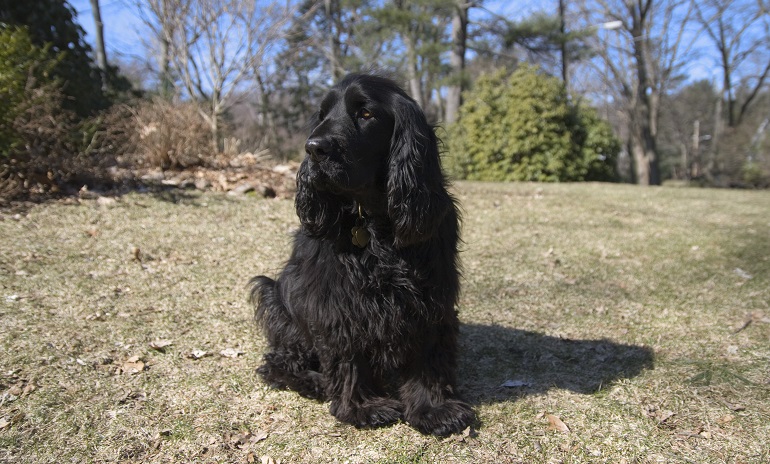
Although the British hunters were using spaniels as their hunting companions till 1800, no one knew the difference between spaniels and categorized them as a single breed. However, at the end of the century, more and more people began taking interest in dogs, so they categorized them into families and breeds.
In the first half of the 19th century, the very first field spaniel dog was developed. The purpose behind its production was to make a special spaniel that can amaze the judges of sport sanctioned.
At the same time, breeders wanted to develop a hunting spaniel that could work well on both water and land fields. During this attempt, scientists developed various other types of spaniels, including cocker and springer spaniels.
All these new breeds were then interbred, which finally resulted in the formation of this field spaniel. Some people believe that the field spaniels were born of English springers, Sussex, and Sussex crosses.
Having an extremely unusual, all-black coat color, the Field spaniel first caught the attention of dog shows, after which it began getting popular among hunters, too.
By the late nineteenth century, all the land spaniels were considered field spaniels. All the field spaniels were black initially but soon, they began developing colors including golden liver, roan, liver, and many different types of dotted patterns.
Those field spaniel dogs were then classified into two main classes, based on their size and coat color; cocker spaniel comprises dogs with small stature, whereas springer spaniel comprises larger dogs with multicolored coats.
To improve the breed, even more, breeders began employing unhealthy breeding practices, which led to severe health complications among the breeding dogs. Not only the health problems, but the resulting offspring showed unpleasant traits like larger heads, too-dense coats, short legs, and way too elongated bodies.
Both the hunters and owner community disapproved of these modifications, and this way, the count of this breed, dropped terribly, causing it to get nearly extinct.
Fortunately, in 1923, a field spaniel society was formed, which worked hard for the revival of field spaniels. Finally, by the 1960s, dedicated breeders were able to rebuild the breed, by mixing springer and cocker blood.
Although the national breed club recognized field spaniels in 1894, the ups and downs this breed had to face, made its status doubtful, at various times in history.
Field Spaniel Facts
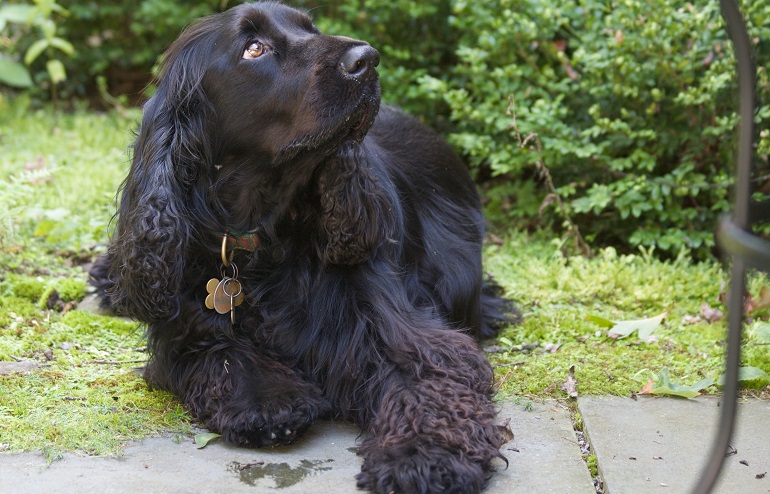
- Field spaniel thrives for both the physical and emotional connection. Therefore, they might get depressed or anxious when locked up in a crate or left alone in the backyard for too long.
- Field spaniels have crazy appetites and they won’t even hesitate to steal the food of other pets.
- Field spaniels can’t resist smells and thus, follow their noses to trace the origin of that smell. Thus, to get sure about your dog’s containment, don’t forget to fence your property properly.
- Field spaniels love water so stopping your adult dog from jumping into the puddles is nearly impossible. Even they can’t resist their temptations to play with the water in their bowl.
- Field spaniels are more comfortable in rural or country suburbs since the noise and hustle of city life might be quite stressful for them.
- The average lifespan of field spaniels is 12-13 years.
Field Spaniel Appearance
Field spaniels have medium-sized and properly well-balanced body type, which serves for both beauty and activity. The structure is longer than taller, supported by thick, muscular, short legs which can pass through the toughest brush easily.
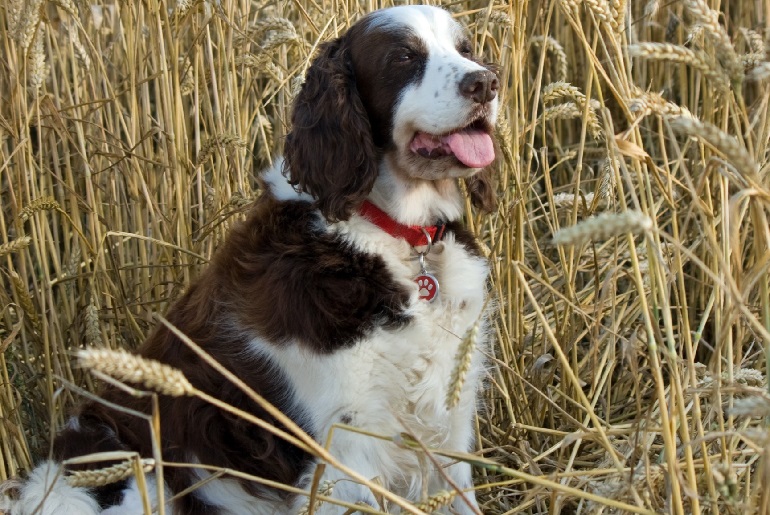
The expressions on their face are super adorable and gentle, with large, almond-shaped glistering eyes. However, besides their short and unusually elongated statures, another one highly distinctive feature is their abnormally long, floppy ears.
These ears are not only moderately long but also somewhat feathered and sit close to the skull, below eye level. Plus, they have webbed feet, which enhance their swimming skills.
Size
Field spaniels may grow up to 43cm-46cm from the shoulder. However, male field spaniels might be taller than female field spaniels.
Weight
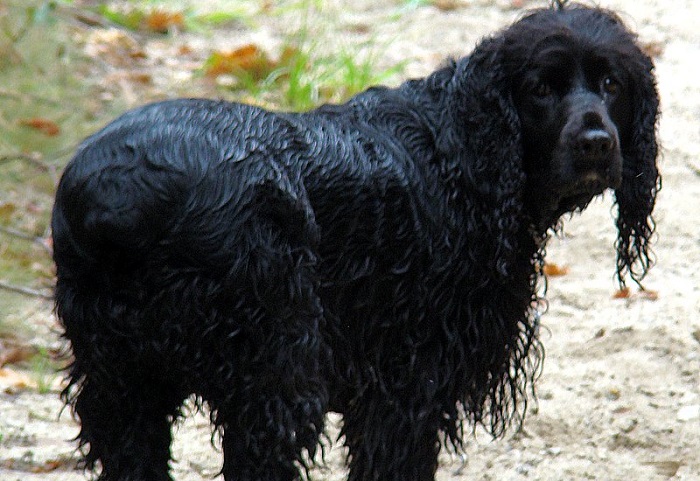
The healthy body weight of a field spaniel is 40-55 lbs (18-25 kgs). However, the weight may vary as per the size. Also, since they love eating without any pause, they are more likely to gain weight super quickly.
Coat
Field spaniels don’t have any undercoats. Instead, they have long, single outercoats only. Even though the coat is not as dense as that of cocker spaniels, it still needs to be trimmed and brushed regularly to prevent matting.
Areas like the belly, ears, behind the legs, buttocks, and torso have more profused feathering. Speaking of the coat texture then it’s waterproof, glossy, straight or slightly wavy, and silky.

Color
Field spaniel dogs mostly feature coats in solid colors like roan, liver, and black. However, some dogs might have white markings and tan points around their chests and throats.
Field Spaniel Temperament and Personality
Being a people pleasure, field spaniel dog needs a lot of attention and affection from their family member. Also, they need this attention not only in the form of cuddles and warm hugs but also in energetic play sessions.
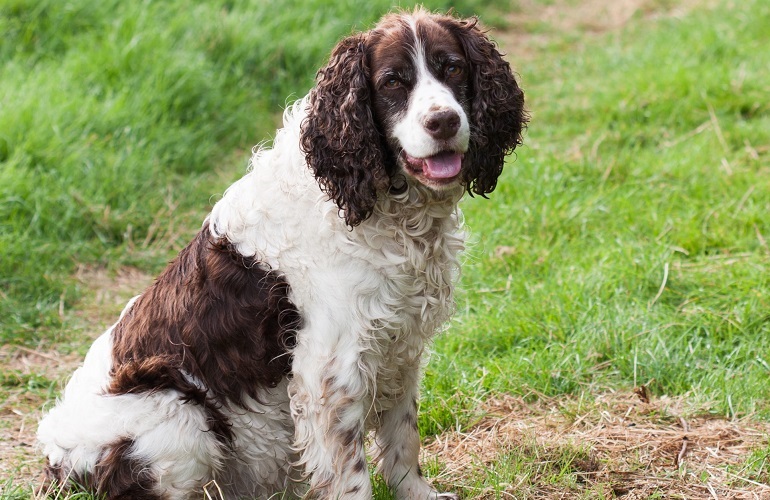
Under normal circumstances, field spaniel dogs are no threat to smaller animals and toddlers but still, it’s better to go for early socialization. Otherwise, they might be too insecure and shy toward guests and strangers.
Similarly, Field spaniel canines don’t bark excessively, but when hearing loud music or sirens, they might get vocal, after receiving too much mental stimulation.
Since they were not originally developed as hunting dogs, they don’t possess unsurpassable prey drives. Due to this very reason, they could make best friends with other animals in your family, including cats. However, since they have high feathering instincts, you better keep them away from pet birds.
As stated before, Field spaniel dogs can’t fight off the temptations to follow certain smells. Therefore, to prevent your dog from getting lost, you better keep him on a leash when outside the house.
Remember that the Field spaniel belongs to the sports breed therefore, you should not think of these canines as lazy, couch potatoes.
To keep them physically, emotionally, and mentally healthy, consider taking them for daily walks for about 1-2 hours. Besides daily strolls, indulge him in sports that require decision-making skills and enhance their agility, obedience, and tracking abilities.
When bored, this energic, four-legged friend can show undesirable behaviors like nuisance barking or chewing, so you better find a job for them and keep them busy, all the time.
Remember that the temperament of a field spaniel depends upon socialization, training, and heredity. Therefore, it’s important to meet at least one of the puppy’s parents to get to know about its nature.
Field Spaniel Health and Care
Field spaniel, like other spaniels, is a healthy dog breed but it might come with some health risks. This could include genetic health problems and health issues caused by inappropriate diets and insufficient exercise. Some of these health conditions field spaniel dogs are prone to develop are as follows;
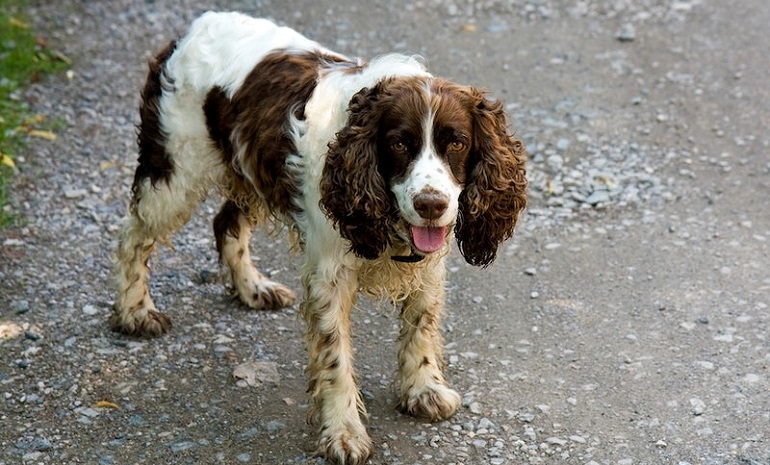
Hip Dysplasia
Hip dysplasia could be caused by both genetic and environmental abnormalities. It’s a degenerative bone disease in which the hip joint and pelvic bones get weakened over time, limiting mobility.
To make sure your pup is not a patient of this disease, ask for the health clearances issued by the orthopedic foundation. The same clearance reports will also brief you about whether your dog is prone to developing other forms of dysplasia or not, including elbow dysplasia.
Progressive Retinal Atrophy
It’s also a degenerative disease that affects a dog’s eyesight. In it, the photoreceptors begin getting damaged at the back of the eye, causing a gradual decrease in sight and ending up in complete blindness.
This genetic disease could be screened years before it starts showing symptoms so to get sure about your dog’s eye health, check the health certificates from the canine eye registry foundation. Other eye diseases which a field spaniel may develop are ectropion and cataracts.
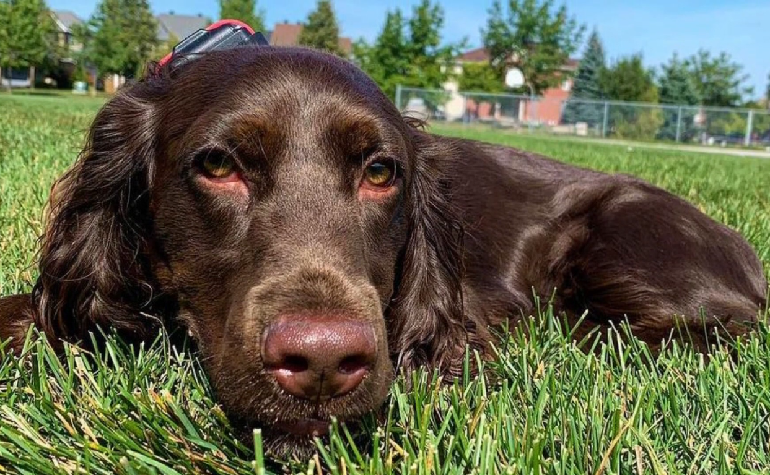
Hypothyroidism
As the name indicates, this problem is related to the underproduction of thyroid hormones. As a result of this condition, all the relevant body functions are get affected. For example, your dog might show signs of infertility, his coat might shed more abruptly, and he might begin gaining weight way too abnormally.
Fortunately, treatment is available by which your pet can live a happy and content life. The only problem is that your dog might need to undergo this treatment for his entire life.
Besides these problems, some dogs are also prone to develop allergies; contact allergies, inhalent allergies, and food allergies. Generally, field spaniel dogs are not sensitive to a certain food group, nor do they have any certain food intolerance but still, it’s better to ask the breeders about the screening results.
The very first and most effective way to prevent these health concerns is to ask for clearance certificates. Once going through the paperwork and bring the puppy home, take extra care of his nutrition, grooming, and exercise.
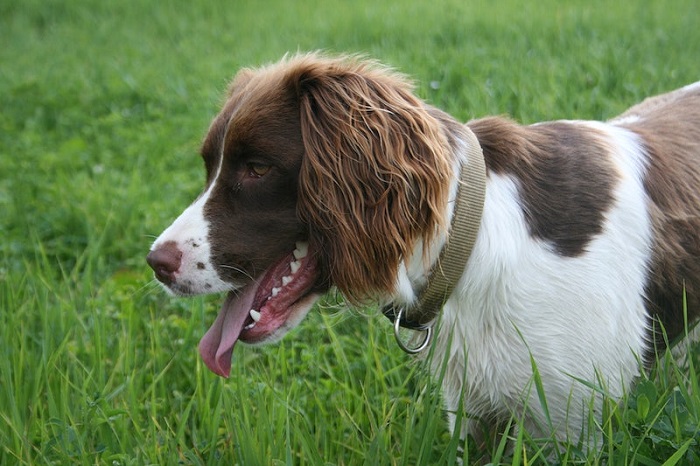
In the market, you’d easily find dog food formulated for canines of certain sizes and age groups. Depending upon the age of your dog, select one option (pup, adult, senior) while opting for the dog food formulated especially for medium-sized canines.
Remember that field spaniel dogs are food motivated and love treats and meals. Thus, to prevent overeating and obesity, feed only two meals a day, and don’t forget to discuss the food portion with a vet.
Speaking of their grooming requirements then field spaniel dogs shed a little extra so you better brush the hair weekly. Regular brushing would not only maintain the silky texture of the coat, by removing dirt and dead hair but will also prevent over shedding.
Since the field spaniel’s ears are floppy, they are more prone to catch infections. Thus, to prevent infections in the auditory canal, clean the ears regularly. To ensure their overall well-being and utmost hygiene, trim their nail and brush their teeth regularly.
Field Spaniel Training
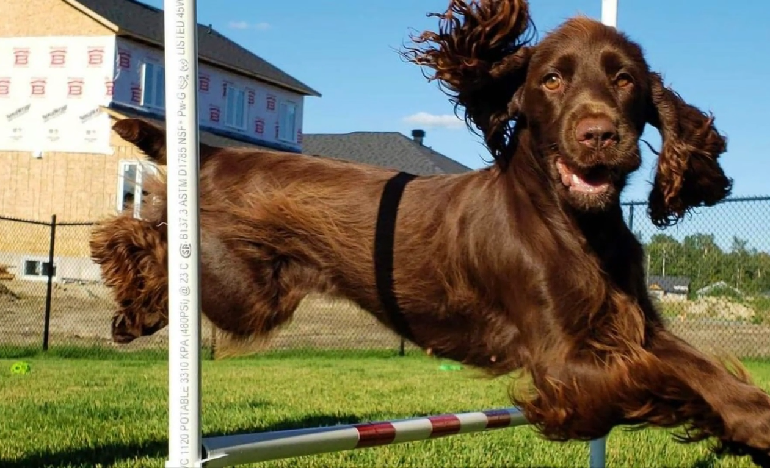
Field spaniels are smart with independent thinking, which makes them super easy to train. However, it’s only possible with positive reinforcement methods like reward-based training. and what could be a better reward than food or delicious treats, for a field spaniel? Just make sure to feed him a treat equal to 10% of the total calorie uptake.
Keep in mind that field spaniel dogs are quite sensitive to tone, so don’t throw commands harshly or arrogantly on your pup’s face. Otherwise, they might get neurotic. Unlike other spaniels, field spaniel takes a bit longer to mature so try to be patient and keep calm.
Also, the curious nature of your pup might impel them to explore the training field, so before moving towards teaching advanced commands, teach them the basic ones like come, sit, stand, go, etc.
Never wait for your pup to grow up and start training from the very first day. Early socialization will help your dog to get familiar with certain voices and faces. The best way to socialize your little pup is to invite guests to your place and let them mix up with the dog.
Besides polishing your dog’s social skills through early socialization, also work on teaching your dog about the boundaries and rules to live inside the house.
The best way to do so is to limit their movements inside the house, since doing so will minimize the risk of developing undesirable habits, including passing out on the floor, chewing, and over-excited behavior.
And if you don’t have much time to train your dog, consider signing up for kindergarten and other dog training institutes. Some institutes also offer specialized puppy classes and adult dog classes.
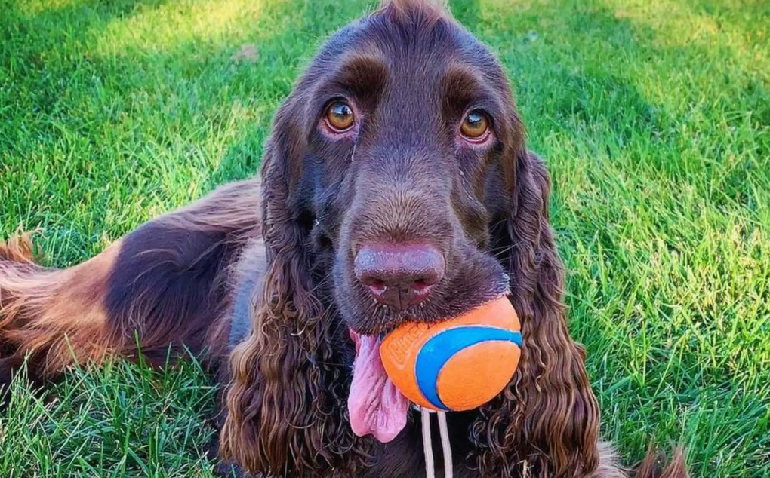
Conclusion
Since field spaniel is one of the rarest dog breeds, purchasing a new pup will definitely cost an arm and leg. So if you are not willing to pay thousands of dollars, search for the dog in field spaniel rescue groups and shelter homes.
On the other hand, while purchasing a pup, make sure you are dealing with a reputable breeder – not the one who’s only up to steal your hard-earned money from you. Reputable dealers don’t only breed the dogs in natural and perfect environments but are also open about the health conditions of pups.
Not only do you need to ask for health clearance certificates of the pup but also of its parents to make sure it won’t develop a hereditary problem later on.
Remember that your responsibilities as a pet owner don’t end here, since you need to take proper care of your dog’s diet too, to prevent the biggest health concern, the root of all health problems; obesity.
Hope you enjoyed learning about this beautiful dog. Keep coming back for more interesting information on animals!












